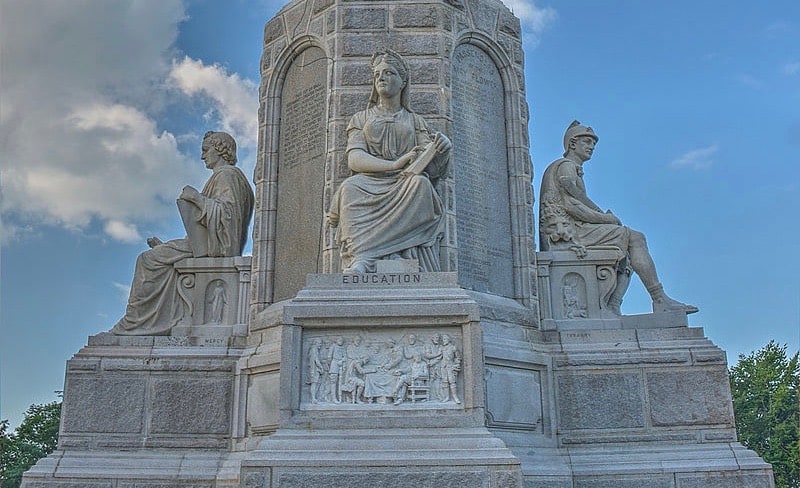The Attack on Voluntary Prayer
[A]s D. James Kennedy once pointed out, in 1935, what was the most educated nation on earth? The answer was Germany. But that didn’t prevent Auschwitz from taking place. So there is such a thing as education, where if it’s devoid of God, it is dangerous.
—Jerry Newcombe—
Key point: In 1962 the Supreme Court denied school children the opportunity to acknowledge God and seek His blessings for their leaders and the nation. America has been paying a heavy price for this ever since.
For summaries of all the articles in this series, go here.
On June 25, 1962, the Supreme Court handed down its ruling in Engel vs. Vitale, a case involving voluntary school prayer. In New York, the state Board of Regents had written a prayer and encouraged students to recite it in school. Participation was voluntary, but in New Hyde Park, New York, a group of students’ families took the matter to court, contending the policy violated their religious beliefs. The group was led by Steven Engel, who was Jewish. The ruling was 6 to 1 in favor of the plaintiffs, and it would have been 7 to 1 if Justice Felix Frankfurter had not suffered a career-ending stroke. Justice Byron White did not participate because he did not take his position on the court until after oral arguments had been made.

Justice Potter Stewart, the lone dissenter, did not believe the prayer was unconstitutional because the Frist Amendment prohibits Congress from establishing an official religion, not from encouraging prayer. Focusing on the Constitution itself, Stewart wrote, “I cannot see how an ‘official religion’ is established by letting those who want to say a prayer say it.”
On the heels of the ruling, Erwin Griswald, former dean of the Harvard Law School, also objected to the majority’s opinion. He pointed out that the First Amendment of the US Constitution had not been violated, since Congress had made no law establishing a state religion. Neither had the State of New York, for that matter. This, he maintained, was a local matter, not a federal one. Moreover, he contended, “In a country which has a great tradition of tolerance, is it not important that minorities, who have benefited so greatly from that tolerance, should be tolerant, too?”
In a country which has a great tradition of tolerance, is it not important that minorities, who have benefited so greatly from that tolerance, should be tolerant, too?
—Erwin Griswold, former dean of the Harvard Law School, objecting to the Supreme Court’s ruling against voluntary prayer in Engel vs. Vitale—
What was the prayer that so offended the majority of justices, as well as the plaintiffs? It was this:
Almighty God, we acknowledge our dependence upon Thee, and we beg Thy blessings upon us, our parents, our teachers and our Country.
The 1962 decision became the basis for other Supreme Court rulings that have further restricted school prayer. Other decisions followed after these, and they’ve affected far more than education: In and through them, “the Supreme Court gave birth to an atheistic tyranny that has bedeviled America ever since.” According to the information site conservapedia.com, “Since the banning of school prayer, there have been a 225 percent increase in amount of children without fathers, a 343 percent rise in illegitimate births, and a 454% enlargement in the violent crime rate. These data are taken from the Index of Leading Cultural Indicators, which in turn relies on statistical data collected since 1960.”
A Departure from Founding Principles
The Founders and early leaders of the United States never intended that God would be separated from government, only that government would not establish an official religion. Consider Noah Webster (1758-1843) who has been called the Father of American Scholarship and Education (also go here), or simply, the Father of American Education.

Writing in 1788, Webster said,
In some countries the common people are not permitted to read the Bible at all. In ours, it is as common as a newspaper and in schools is read with nearly the same degree of respect.…Select passages of Scripture…may be read in schools, to great advantage.…My wish is not to see the Bible excluded from schools but to see it used as a system of religion and morality.
Returning to Engel vs. Vitale, we note that in this critical decision, the Supreme Court severed an acknowledgement of God—actually, an opportunity, not a requirement, to acknowledge Him—from the younger generation of Americans.
When a nation, in this case through its court system, kicks God out of public life, what happens? We’ve seen evidence that God steps back! We see this not only in the unraveling of American culture since the early 1960s, but also in the other two Supreme Court cases my friend Steve cited when he wrote about America’s decline.
Stay tuned!
Copyright © 2018 by B. Nathaniel Sullivan. All rights reserved.
Unless otherwise indicated, Scripture has been taken from the New King James Version®. Copyright © 1982 by Thomas Nelson, Inc. Used by permission. All rights reserved.
 About “Education” (see top image; photo credit here)
About “Education” (see top image; photo credit here)
At the National Monument to the Forefathers in Plymouth, Massachusetts, Faith stands atop the Monument, with Liberty and Morality seated at the base in front of her, and Law and Education seated at the base behind her. Education benefits a nation to the greatest extent possible when it affirms each of the other four values and ideals portrayed. The National Monument to the Forefathers was dedicated on August 1, 1889.

Be First to Comment